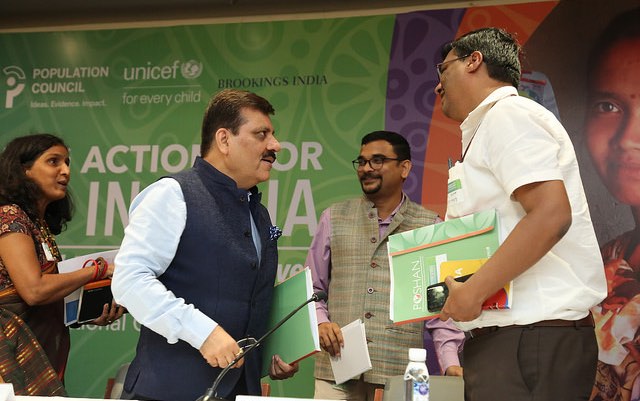New research analyses of key demographic data shine light on the drivers of India’s progress on malnutrition, assess the emergence of new problems such as overweight and non-communicable diseases, and assess how policies and programs are reaching target populations. Participants in a September 4 conference in New Delhi—“Strengthening Actions for Nutrition in India: Insights from the National Family Health Survey” (NFHS)—explored the findings and their applications.
“The multidimensional analysis of National Family Health Survey data will help us navigate the health and nutrition programs, and understand the gaps that must now be closed,” said keynote speaker Vinod Paul of NITI Aayog (National Institution for Transforming India).
September is India’s National Nutrition Month: Activities organized under the anti-malnutrition program POSHAN Abhiyaan are taking place nationwide. The conference brought together researchers, policy makers, program implementers, and other nutrition stakeholders. It was designed with the long-term view of bringing data and evidence to bear on the fight against malnutrition. Participants included researchers from IFPRI, Brookings India, the International Institute for Population Sciences (IIPS), the Society for Applied Studies (SAS), the Population Council, and more than 130 members of India’s nutrition community.
“Through empirical analyses of data from the NFHS-4 surveys shared at this workshop, we want to collectively inform India’s policy efforts by bringing things together on the scope of the nutrition problem, the drivers of nutritional outcomes and the reach and scale of India’s programs,” said Shamika Ravi, director of research at Brookings India, one of the event’s co-hosts, and the lead convener of a network of research institutes working on NFHS-4 data.
Researchers have been digging deep into the NFHS-4 data, released in Feb. 2018. The studies examine childhood stunting, wasting and other nutrition outcomes, identifying the factors that have contributed to some of the improvements that India has seen in the past decade. The research presentations explored what determines of nutrition outcomes, such as infant and young child feeding practices and issues like gender and poverty. Presentations on the reach and scale of nutrition interventions delivered by India’s national programs also looked at progress in the decade prior to the launch of POSHAN Abhiyaan in 2017.
For example, one presentation on the prevalence of anemia among women and children in India between 2006 to 2016 noted that even though there has been an improvement of 8 percentage points among pregnant women, data is not collected for children aged 6-14. This means that girls entering puberty are not captured—a significant data gap. Another presentation noted the rising trends of overweight and obesity among children in India and their association with commercial baby-food consumption, and suggested that the news media stop glorifying baby food as a substitute for more nutritious food.
Speaking at the policy panel, Ministry of Health and Family Welfare Deputy Commissioner Ajay Khera said that now is an unprecedented time for accelerating nutrition actions in India. “The analyses presented here are instrumental in pointing to the priority areas and setting the direction of the ongoing programs,” he said.
IFPRI is collaborating with NITI Aayog on several data analytics and research projects to support the government’s nutrition efforts. Stressing the importance of creating a strong data-focused environment to realize the vision of a healthier and malnutrition-free India, IFPRI Senior Research Fellow Purnima Menon said: “The research community must continue to distill and synthesize the insights emerging on each of the topical areas that India’s nutrition mission is focused on, and help to bring those insights back to the policy community to shed light on what’s working, what’s not working and what else needs to happen to make India malnutrition-free.”
Pratima Mathews is an IFPRI Communications Specialist based in New Delhi. This post originally appeared on the POSHAN blog.
Click here for abstracts of papers presented at the event, and here for photos.







